Man Rudely Rejects His Brother's Offer to Babysit His Dogs While He's on Vacation and Calls Him Extremely Irresponsible
If you are a pet owner, then you know that planning a vacation also requires finding a sitter for your pets while you are away. It's pretty much the first thing you try to schedule along with your trip.
Every pet owner wants to go on vacation relaxed, knowing that their beloved pets will be well cared for while they are away. Once you arrange this aspect, the rest is easy.
From experience, pet owners say that a professional sitter is much better than a family member or even a friend. The reason for this is simple.
When you pay for a professional service, you receive a professional service. Besides, sitters are typically people who adore pets.
They already understand pets' needs, so with slight instruction, you can be sure that your pets will be in safe hands. As for friends and family, they would certainly do everything they can, but would it be enough if they don't have pets of their own and lack experience in babysitting them? Well, no one can tell for sure.
That's why this Reddit user hired a sitter for his dogs while he would be away on vacation with his boyfriend. However, the problem arose when his younger brother heard about it.
He was planning to take care of the dogs. As he explained, they had never had pets as kids, so his brother thought this would be his chance to finally own dogs and play with them, even if it was just for a weekend.
But the Redditor stuck to his previous decision because he believes his brother is an irresponsible person. He explained everything in the story below but still wonders if he was wrong for not allowing his brother to watch his dogs.
Here's the story:

They were never allowed pets when they were kids, so his brother has no experience watching them.
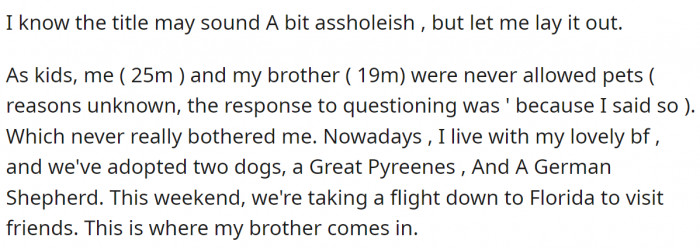
So the Redditor had a good reason to reject his brother's offer, but he didn't think he would be so offended.
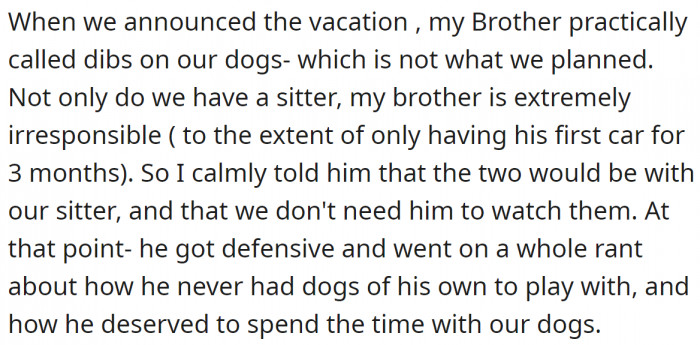
Understanding Family Dynamics
The relationship between siblings often reflects complex dynamics shaped by childhood experiences.
Dr. Julia Kim, a developmental psychologist, notes that family roles can significantly influence adult behavior, particularly in stressful situations.
According to her research, siblings often adopt roles such as the caretaker or the rebel, which can lead to misunderstandings and conflicts over responsibilities, especially in cases involving shared pets.
Understanding the Psychology Behind This Situation
Dr. Emily Carter, a clinical psychologist at the University of Michigan, notes that the rejection of a family member's help often stems from deeply held beliefs about autonomy and responsibility.
This behavior may reflect an individual's desire to maintain control over their environment, particularly regarding pets, which are often viewed as family members.
Research shows that our relationships with pets can mirror our interpersonal dynamics, leading us to react defensively when we feel criticized or judged, even by loved ones.
"I told him they were our dogs, and we make the decisions about them."
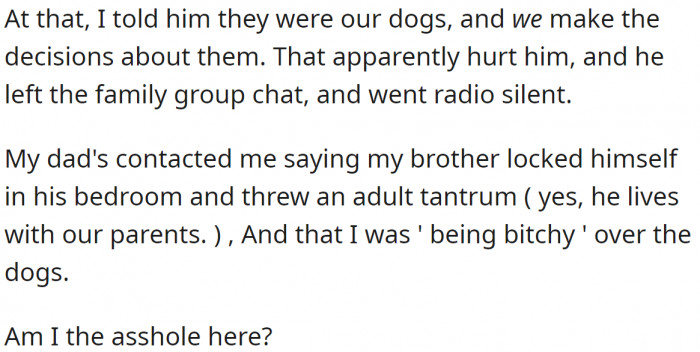
"You are not obligated to let him have time with YOUR pets."
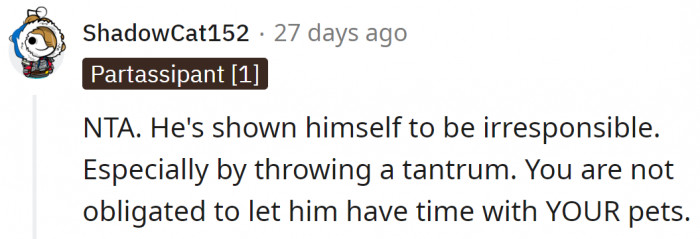
Someone wanted to clarify why he believes that his brother is irresponsible:
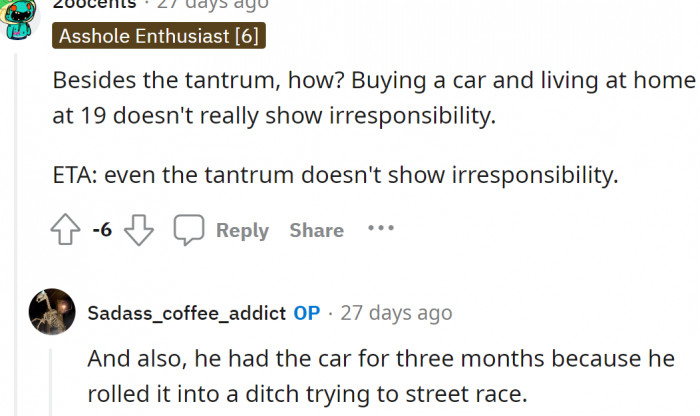
Research from the Journal of Family Psychology indicates that communication styles within families can lead to misunderstandings, especially when discussing responsibilities.
In this situation, the brother's perception of irresponsibility may stem from his own experiences or insecurities about his ability to care for the dogs.
Understanding these nuances can help facilitate a more productive conversation about expectations and family support.
According to Dr. Sue Johnson, a couples therapy pioneer, "When individuals feel their choices regarding pets are questioned, it can trigger a defensive response, often rooted in anxiety." This anxiety can manifest as anger or dismissal, potentially harming family relationships. Dr. Johnson emphasizes the importance of understanding these dynamics, stating, "Recognizing the emotional attachments we have to our pets can foster more open communication and reduce conflict within families." For more insights, visit her professional website at iceeft.com.
They are dogs, not toys.
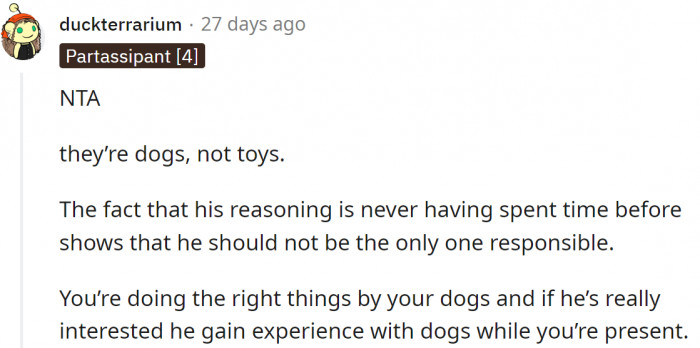
He'll get over it once his rage passes.
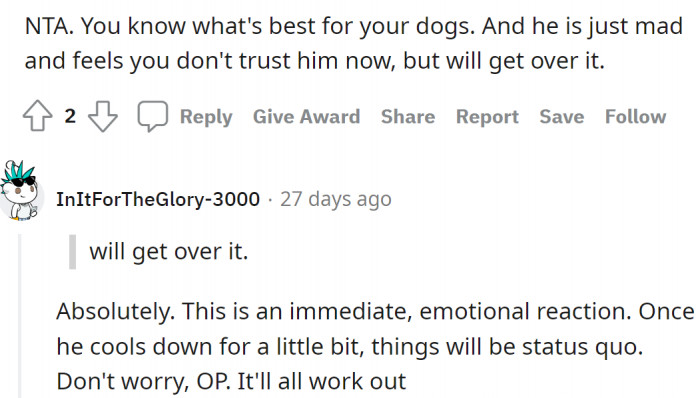
"You've done nothing wrong here."
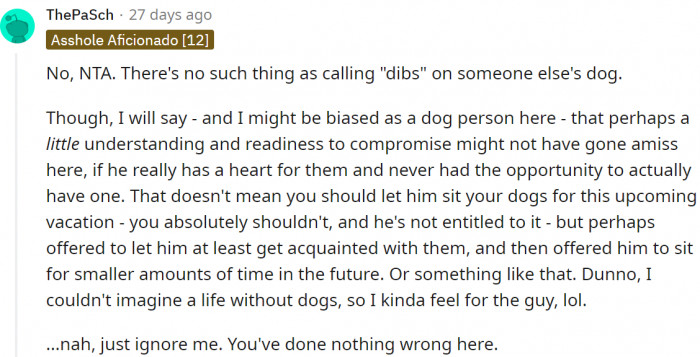
The Impact of Stress on Decision-Making
Decisions made under stress can often be influenced by emotional responses rather than rational thought processes.
Behavioral studies suggest that when individuals feel overwhelmed, their decision-making capabilities can decline, leading to reactions that may seem extreme to others.
This phenomenon might explain why the brother reacted defensively when offered help, perceiving it as a challenge to his authority over his pets.
The Role of Attachment in Pet Ownership
Attachment theory, developed by John Bowlby, provides a framework for understanding how pet owners bond with their animals.
For many, pets represent unconditional love and companionship, filling emotional voids that may exist in human relationships.
Dr. Lisa Green, a developmental psychologist, emphasizes that when owners feel threatened—such as in this case—by an external party's involvement, they may react defensively to protect that attachment.
Same here.

His perception of the meaning of 'watching dogs' is childish.
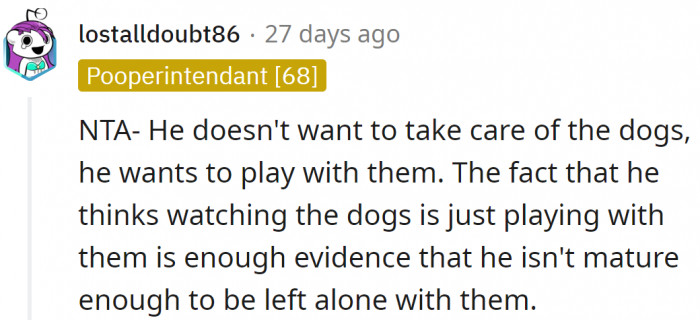
"He still acts like a child, so it’s his fault you treat him like one."
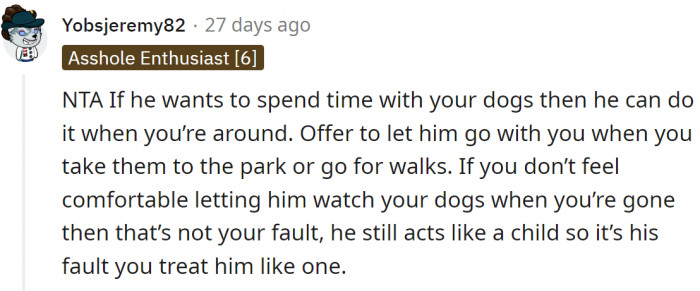
To improve family communication, establishing clear boundaries and expectations can help alleviate tension.
Research in conflict resolution emphasizes the importance of open dialogue, where each party can express their feelings without fear of judgment.
Utilizing 'I' statements can also foster understanding, such as saying 'I feel overwhelmed when asked to care for the dogs' instead of assigning blame.
Behavioral psychologists suggest that clear communication about expectations and responsibilities is key to avoiding misunderstandings.
In this context, discussing feelings about pet care with family members can help establish boundaries and foster understanding.
Practicing 'I' statements, such as 'I feel anxious when decisions about my dogs are made without my input,' can create a safe space for dialogue.
After all the provided details, Redditors agreed that his decision to leave their dogs with a sitter rather than with his brother was the right one. Even though his brother has a strong desire to own pets and play with them, watching them for the entire weekend is a totally different situation that he is still not ready for.
One day he may show his responsibility toward everything, even the dogs. But at this moment, he is just not the right person for such an important task.
Psychological Analysis
This situation highlights the complexities of familial relationships and the psychological weight carried by pet ownership.
It's not uncommon for individuals to feel an intense need to protect their pet's welfare, which can lead to defensive reactions when faced with outside opinions.
Analysis generated by AI
Analysis & Alternative Approaches
Research consistently supports the notion that our relationships with pets are deeply intertwined with our emotional health, as pet ownership can evoke strong feelings of attachment.
As noted by various psychological studies, addressing underlying fears and anxieties through open communication is crucial for strengthening family bonds.
Recognizing that pet care decisions can trigger emotional reactions can pave the way for healthier discussions and improved family dynamics.
Navigating Feelings of Responsibility
Feelings of responsibility can often trigger heightened emotional responses, particularly when pets are involved.
Psychological research indicates that pet ownership elicits strong emotional attachments, making decisions about their care deeply personal and often contentious.
Recognizing this emotional weight can help family members approach discussions about pet care with empathy and understanding.
Analysis & Alternative Approaches
Ultimately, navigating family dynamics requires both emotional intelligence and effective communication strategies.
As highlighted by research in family psychology, addressing underlying feelings and fostering open dialogue can lead to healthier relationships.
With patience and understanding, family members can learn to support each other in ways that respect individual roles while enhancing collective responsibility.



